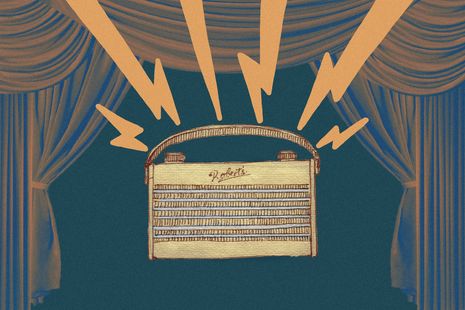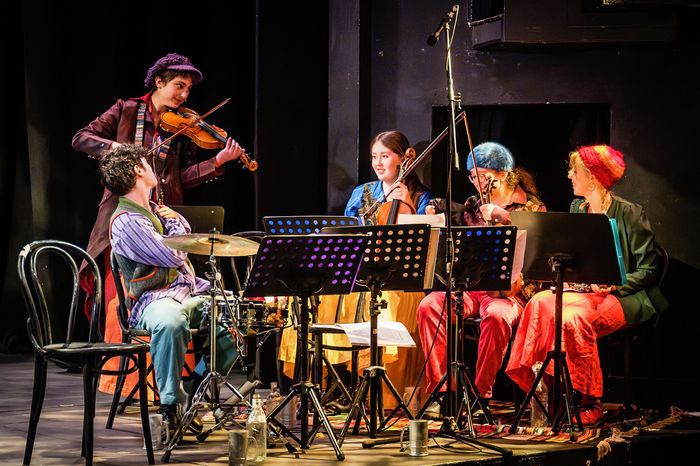What can theatre learn from audio drama?
Shan Tan-Ya asks the creators behind a hit audio drama to discuss the genre’s relationship to theatre and other mediums.

I have a theory – audio drama is just theatre taken to its logical extreme. Hear me out: when modern film special effects can create any conceivable illusion, why do people still watch plays? There’s something about reducing the amount of sensory input, about having to exercise our imaginations, which somehow appeals to audiences. In audio drama, everything is implied through sound alone – there are no visuals to distract from the dialogue, delivery and soundscape. Therefore, when every pause or gasp could have plot-altering significance, listeners can focus intently on performance, and feel even more deeply connected to the characters.
At least, that’s my explanation for the presence of hundreds of fans, mostly under the age of 30, who gathered one Sunday in early September at the London Podcast Festival in King’s Place for a seminal event in the fandom – the 10-year anniversary reunion of the team behind hit show Wolf 359. For context, Wolf 359 has been cited as one of the top 20 most influential audio dramas in the last 50 years, making it a decent case study for the genre’s ‘renaissance’ this century. It also tops my own personal list for Varsity – in brief, it’s a serialised comedy-action-sci-fi drama about a dysfunctional crew trapped on a mysterious space station. These rock stars of the audio drama world had flown halfway around the world from the US to meet us so naturally, I was determined to quiz them for Varsity.
“These rock stars of the audio drama world had flown halfway around the world from the US to meet us”
Miraculously, given the sea of raised hands, I got to ask my question: what was one thing the creators loved about audio drama compared to other mediums? To my surprise, all the actors present, including the moderator, had something to say. Whilst I was familiar with the joys of audio drama as a listener, they highlighted how its great advantage for actors was that it offers opportunities outside of a ruthless mainstream industry that won’t give you the time of day unless you look exactly like your ‘type’. Lead actress Emma Sherr-Ziarko was told that her type was Alien’s ‘Ellen Ripley’ but she was too short to convincingly pull it off on-camera or on-stage. Voicing stern Commander Minkowski was therefore her only chance to “really embrace… my Sigourney Weaver”.
Using appearance or ‘type’ as casting shorthand is, of course, inherently problematic, especially for non-white actors in Western media. Even a decision as mundane as ‘do you look like a barista? ’ becomes loaded when you consider, “Who decides who looks like a barista?”, pointed out actress Cecilia Lynn-Jacobs. Lynn-Jacobs is Black, and when she first joined the show, the countless New York Downtown theatre gigs she’d acted in had repeatedly handed her either one of just two roles: ‘angry Goddess’ or ‘prostitute’ – which was “pretty demoralising”. In contrast, on Wolf 359, she plays the charismatic but morally complex Captain Lovelace, whose past is central to the show’s mystery. At this point, the moderator, Karim Kronfli, a veteran voice actor of over 130 different shows, jumped in with another stark anecdote – “being physically the way I am [a POC], I would typically be typecast as some kind of terrorist. But in audio, I can play five different things a week”.
“Even a decision as mundane as ‘do you look like a barista? ’ becomes loaded when you consider ’Who decides who looks like a barista? ’”
In terms of acting styles, stage-trained Sherr-Ziarko struggled at first to adapt to voice-specific techniques, but ten years later she identifies a ‘similarity of process’ between the disciplines. As an acting coach, she recommends audio drama to theatre students in an increasingly harsh industry because “the world opens up for what you can do and who you can play. (…) I really do think there’s a correlation in skill set between theatre training and audio drama specifically”. At the same time, actress Michele Agresti warned that, counterintuitively, there’s not much room to hide with voice acting: “I think, as actors, the most ‘transformative medium’ really is live performance and being on stage…but when you get into film or recording, it’s very nakedly you”. Actor Scotty Shoemaker also revealed his personal voice-acting technique – as the smiling villain Cutter, he would grip a kitchen knife to record particularly menacing speeches. “Even though nobody can see it, it will be there and they will hear it,” agreed Sherr-Ziarko.
There is another major difference between theatre and audio drama, which Lynn-Jacobs identified perfectly. Live theatre is inherently social, thriving on the feedback loop between performer, audience member and crowd. Audio dramas, by contrast, are “a private experience that you can take into your life, and wherever you take it into your life, it changes how the story hits too”, – something I can certainly relate to. The intimacy of this experience, however, strengthens my opening theory, since, more so than audiobooks, audio drama is about “specifically creating a sonic world”. As in theatre, listeners need “some onboarding to (…) take in the world and build it”, and through this level of engagement, bring large parts of themselves into the story.
I hope that theatre creatives can take inspiration from this unique genre of storytelling – whether that’s through more adventurous sound design, voice-acting, or casting choices. You’d be surprised by the amount of suspense, heart and hilarity that can be conveyed through our ears alone.
 News / Right-wing billionaire Peter Thiel gives ‘antichrist’ lecture in Cambridge6 February 2026
News / Right-wing billionaire Peter Thiel gives ‘antichrist’ lecture in Cambridge6 February 2026 Features / From fresher to finalist: how have you evolved at Cambridge?10 February 2026
Features / From fresher to finalist: how have you evolved at Cambridge?10 February 2026 Film & TV / Remembering Rob Reiner 11 February 2026
Film & TV / Remembering Rob Reiner 11 February 2026 News / Churchill plans for new Archives Centre building10 February 2026
News / Churchill plans for new Archives Centre building10 February 2026 News / Epstein contacted Cambridge academics about research funding6 February 2026
News / Epstein contacted Cambridge academics about research funding6 February 2026










